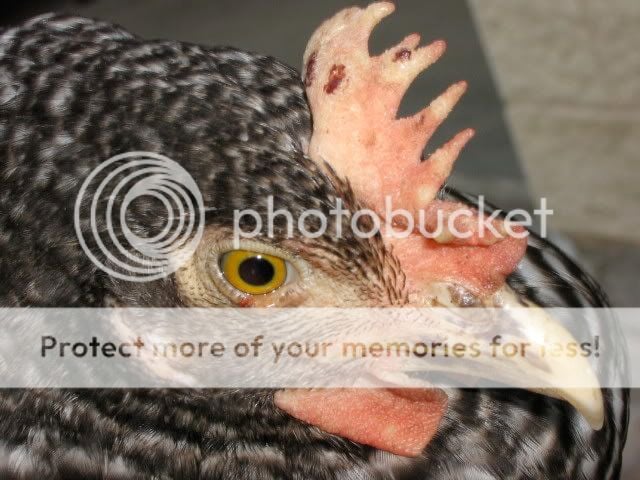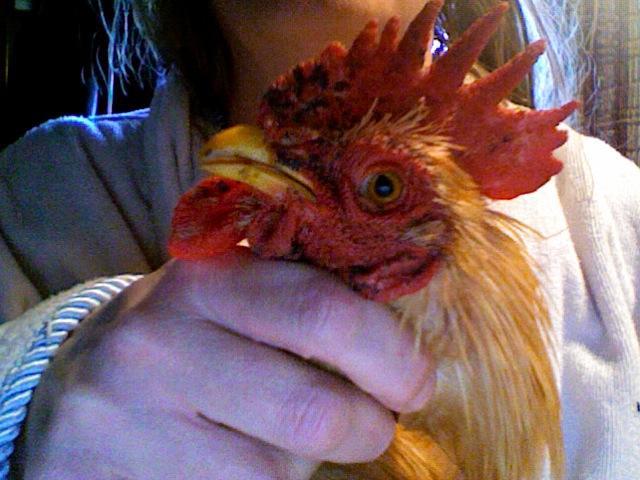- Sep 27, 2008
- 3
- 0
- 7
I have an 8 mo. old Barred Rock who is listless and eating very little. Her comb is very pale, and has 2 dark bumps or spots--I looked at the photo on this site of a chicken's comb with Avian Pox--it might be that...
Our set-up, coop and feeding:
We are new chicken owners. We have 8 hens we raised from chicks. They began laying this summer. They have a wooden coop with deep litter made up of mostly dried leaves. the floor is raised 1 ft from the ground and is metal screen on the bottom, rather than solid wood--that was our idea to help keep it dry. As a result, we can't walk inside the coop--it's small anyway, 4 x 8-- but instead we access the water bucket and feeder by lifting the whole roof. The wall can be removed when it is time to remove all litter--which we have not done yet.) I thought ventilation was adequate, but did notice mosquitos lurking in the shadows yesterday. (Would it be a good idea to rig up a fan? or would this create a harmful draft for the chickens?) The outdoor run--dirt-- is small (5x5, plus they can go UNDER the coop) but usually they get free range of the large back yard for either the whole day or half the day, and they prefer this, of course. (I feel guilty though--they were confined more than usual this week--could that have started this problem in such a short time?) They have laying mash inside the coop and outside we give them some scratch, and quite a lot of kitchen scraps, mostly fruit and veg, but also pasta and bread. (But because of the coop set-up I'm not really sure how much mash they eat. We fill up this huge metal feeder which holds 50 lbs, I think.)
Sequence of events:
One night "Minerva" was not sleeping on the roost w/the others, but on the floor. Next morning she came out of the coop slowly and reluctantly and that was when I noticed that her comb was not bright red like the others, but sickly pink, with the "scabs". She felt light-weight. I put some QuickChick electrolite powder in water, with a mashed garlic clove, for the whole flock, and put some of this water right in front of her, which she drank. That evening, in separate quarters, she pecked at some watermelon and a few pieces of grapes.
The next day (yesterday) I went to our local feed store and described the situation. They said, sounds like mosquitos gave her Pox, and I should treat the whole flock with Tetracyclene as a preventative of reperatory illness (and NOT eat the egss). When I got home I decided to wait on starting the antibiotic until I could search the internet--
--and that's how I found this great web-site. Can anyone advise me what to do? This is our first crisis with our beautiful birds, who have been a joy to us, they are so tame and charming. This morning "Eagle", our Araucuna, appears to have a scab on comb--but no paleness and has normal energy so far. I'm very worried. Minerva ate some more grapes, drinks a sip or two of water. At least she doesn't seem worse. I don't NOTICE that any of them are having difficulty breathing, or are sneezing or anything right now. I have seen them with beaks open on other days, during hot weather.
I will be reading more about chicken care on this site in the next few days and see what improvements we could make in their care, but I feel this is an emergency and I should post this today.
Thanks so much, everybody, for reading.
Aralee in Houston, TX, Sunday, Sept.29
Our set-up, coop and feeding:
We are new chicken owners. We have 8 hens we raised from chicks. They began laying this summer. They have a wooden coop with deep litter made up of mostly dried leaves. the floor is raised 1 ft from the ground and is metal screen on the bottom, rather than solid wood--that was our idea to help keep it dry. As a result, we can't walk inside the coop--it's small anyway, 4 x 8-- but instead we access the water bucket and feeder by lifting the whole roof. The wall can be removed when it is time to remove all litter--which we have not done yet.) I thought ventilation was adequate, but did notice mosquitos lurking in the shadows yesterday. (Would it be a good idea to rig up a fan? or would this create a harmful draft for the chickens?) The outdoor run--dirt-- is small (5x5, plus they can go UNDER the coop) but usually they get free range of the large back yard for either the whole day or half the day, and they prefer this, of course. (I feel guilty though--they were confined more than usual this week--could that have started this problem in such a short time?) They have laying mash inside the coop and outside we give them some scratch, and quite a lot of kitchen scraps, mostly fruit and veg, but also pasta and bread. (But because of the coop set-up I'm not really sure how much mash they eat. We fill up this huge metal feeder which holds 50 lbs, I think.)
Sequence of events:
One night "Minerva" was not sleeping on the roost w/the others, but on the floor. Next morning she came out of the coop slowly and reluctantly and that was when I noticed that her comb was not bright red like the others, but sickly pink, with the "scabs". She felt light-weight. I put some QuickChick electrolite powder in water, with a mashed garlic clove, for the whole flock, and put some of this water right in front of her, which she drank. That evening, in separate quarters, she pecked at some watermelon and a few pieces of grapes.
The next day (yesterday) I went to our local feed store and described the situation. They said, sounds like mosquitos gave her Pox, and I should treat the whole flock with Tetracyclene as a preventative of reperatory illness (and NOT eat the egss). When I got home I decided to wait on starting the antibiotic until I could search the internet--
--and that's how I found this great web-site. Can anyone advise me what to do? This is our first crisis with our beautiful birds, who have been a joy to us, they are so tame and charming. This morning "Eagle", our Araucuna, appears to have a scab on comb--but no paleness and has normal energy so far. I'm very worried. Minerva ate some more grapes, drinks a sip or two of water. At least she doesn't seem worse. I don't NOTICE that any of them are having difficulty breathing, or are sneezing or anything right now. I have seen them with beaks open on other days, during hot weather.
I will be reading more about chicken care on this site in the next few days and see what improvements we could make in their care, but I feel this is an emergency and I should post this today.
Thanks so much, everybody, for reading.
Aralee in Houston, TX, Sunday, Sept.29






